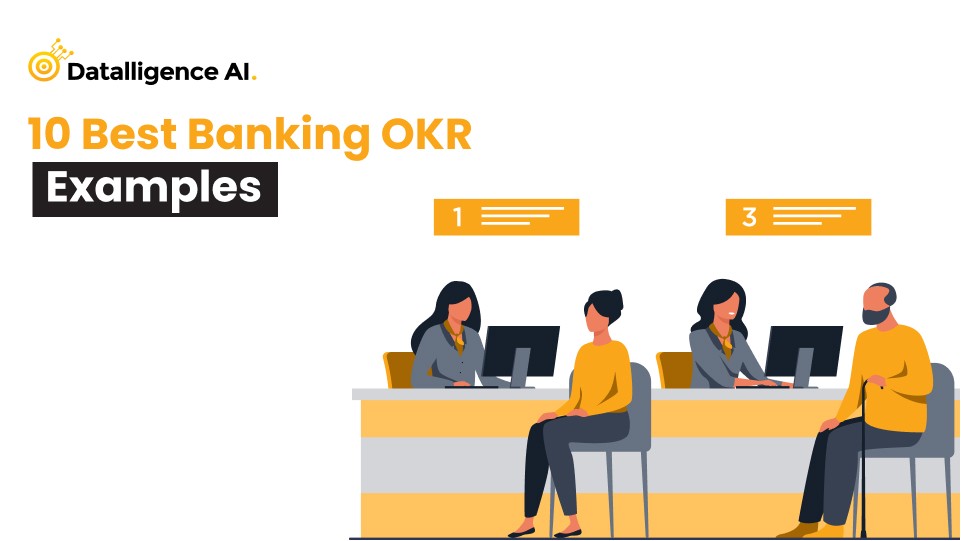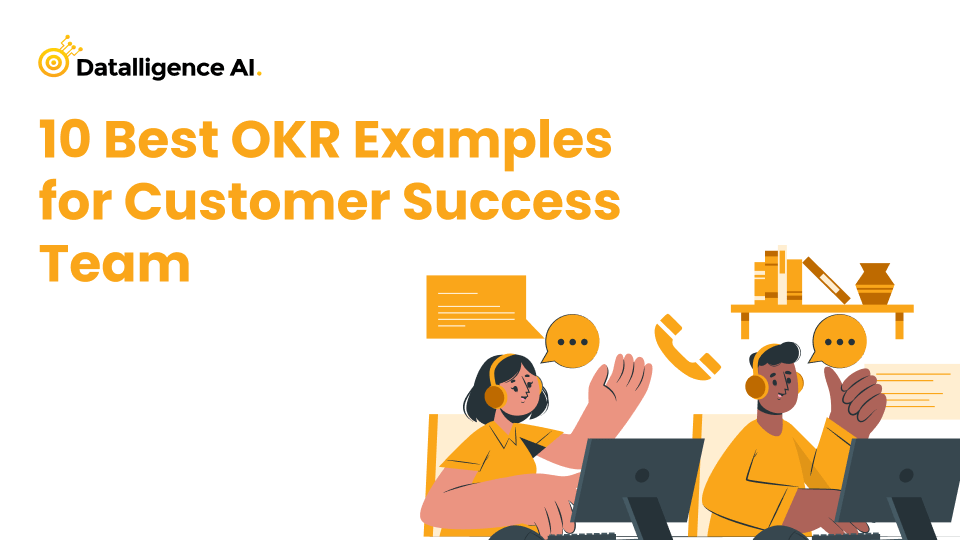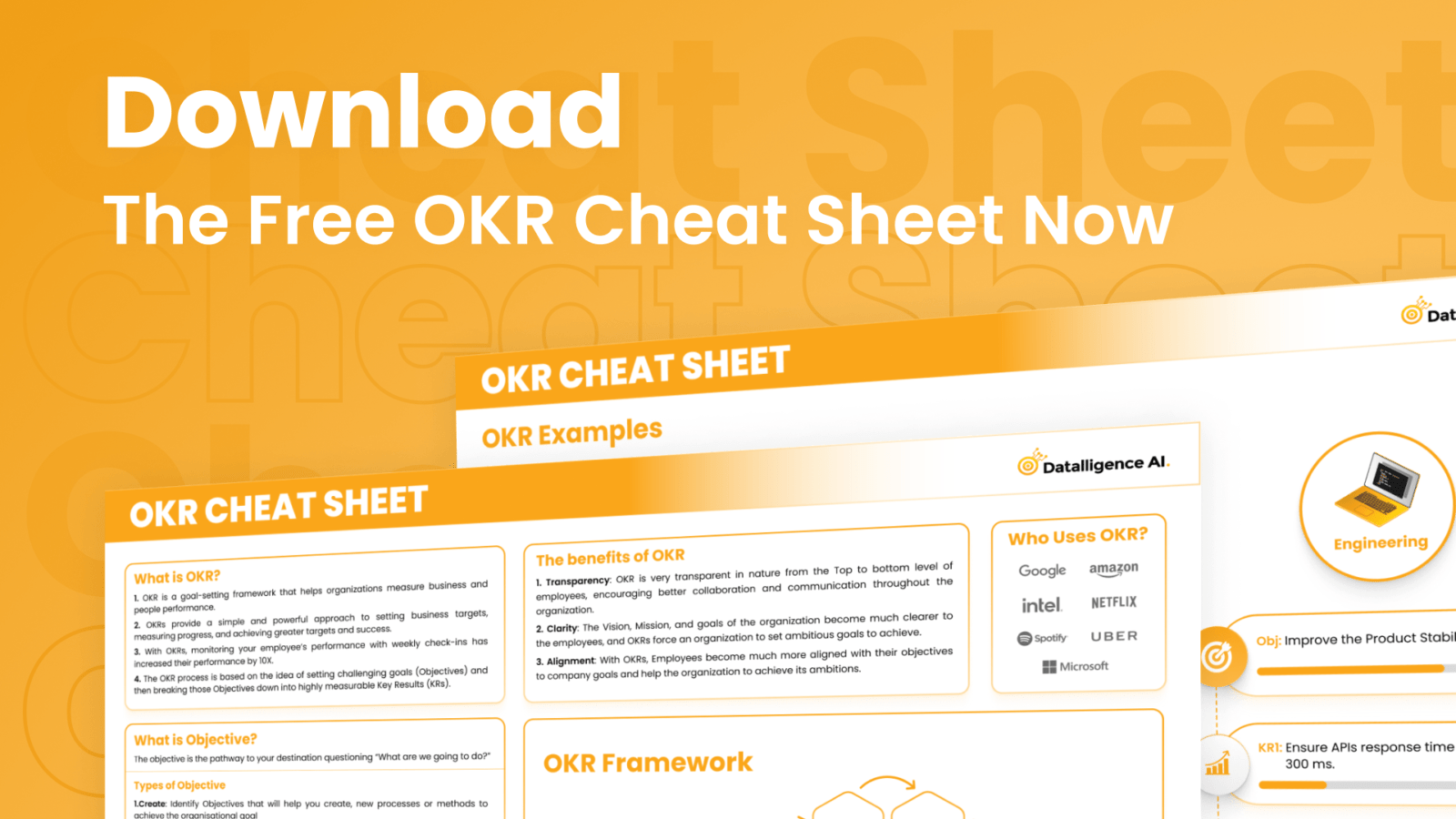Setting SMART goals is firmly integrated with the OKR framework, as both methods emphasize clarity, focus, and measurable outcomes. By leveraging the strengths of SMART goals within the broader OKR structure, organizations can ensure that individual objectives align seamlessly with larger strategic goals.
By combining the precision of SMART goals with the scalability and dynamic tracking capabilities of OKR software, organizations can enhance productivity, foster motivation, and drive employee development, creating a more agile and goal-oriented workforce. This integration not only ensures goals are met but also helps adapt to changing priorities and scale progress across teams effortlessly.
 In this blog, we’ll dive deeper into why effective goal setting is crucial for success and explore how you can achieve your objectives through a structured approach using OKRs and SMART principle
In this blog, we’ll dive deeper into why effective goal setting is crucial for success and explore how you can achieve your objectives through a structured approach using OKRs and SMART principle
George T. Doran created the SMART acronym to guide the process of setting meaningful objectives at various levels within an organization. Each element of the acronym represents a key factor to consider when setting SMART goals.
Why Set Professional Goals?
Setting professional goals is crucial for several reasons:
- Direction and Focus: Goals provide a clear path for what you want to achieve, helping you stay focused on important tasks.
- Motivation: Well-defined goals can boost your motivation and drive, making it easier to stay committed.
- Measurable Progress: Goals allow you to track your progress and measure success, ensuring you stay on track.
- Career Development: Setting and achieving goals can lead to personal and career growth, opening up new opportunities.
- Increased Productivity: Goals help prioritize tasks and allocate time effectively, enhancing overall productivity.
How to Set Professional Development Goals
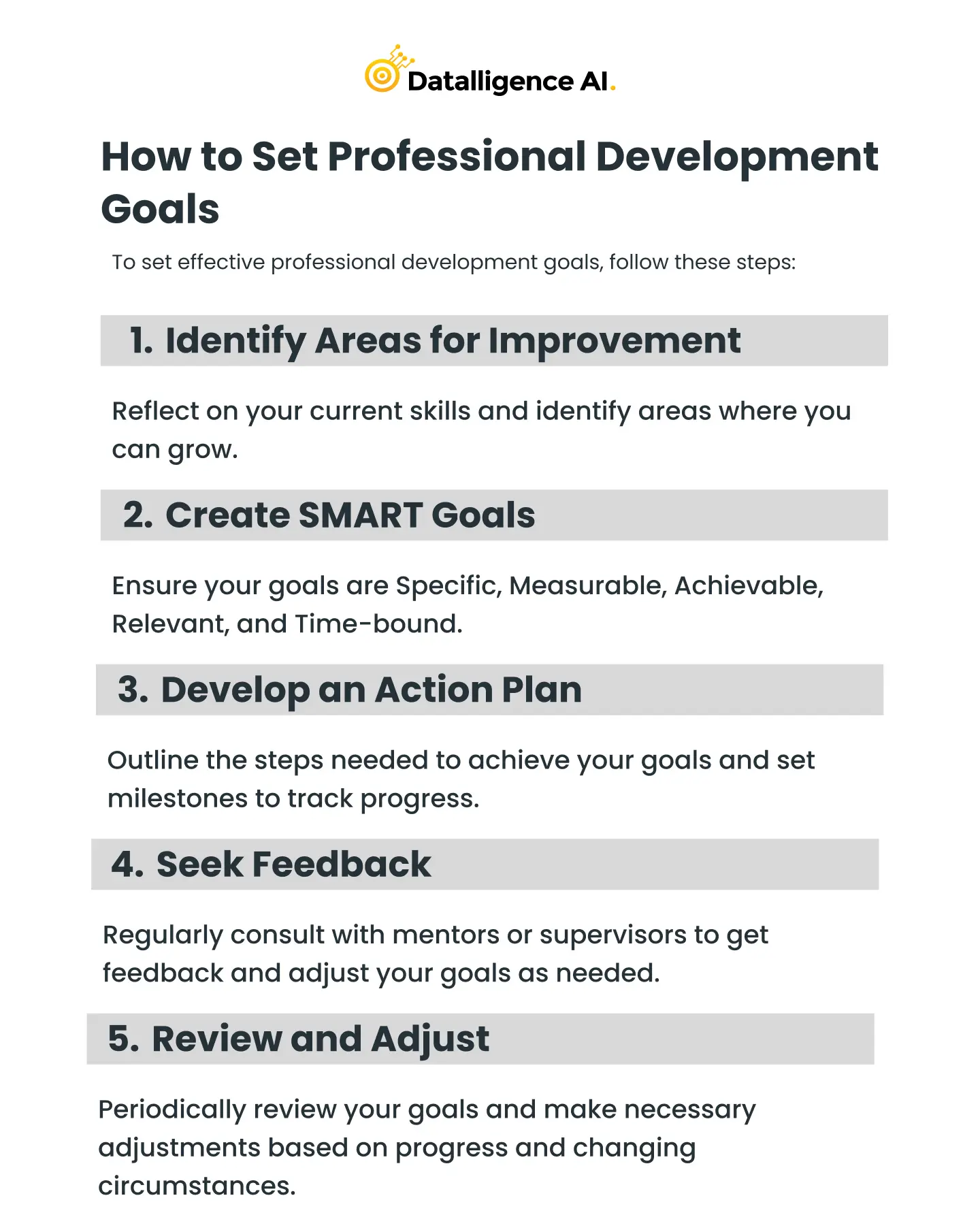
Review and Adjust: Periodically review your goals and make necessary adjustments based on progress and changing circumstances.
15 Best Examples for Professional Smart Goals for 2025
As we approach the new year, it’s time to set ourselves up for success by setting professional smart goals for 2025. Smart goals are specific, measurable, achievable, relevant, and time-bound objectives that can help individuals enhance their skills, achieve career milestones, and make significant progress in their professional lives. In this article, we will explore 15 best examples of professional smart goals that you can implement to advance your career and reach new heights in the coming year.
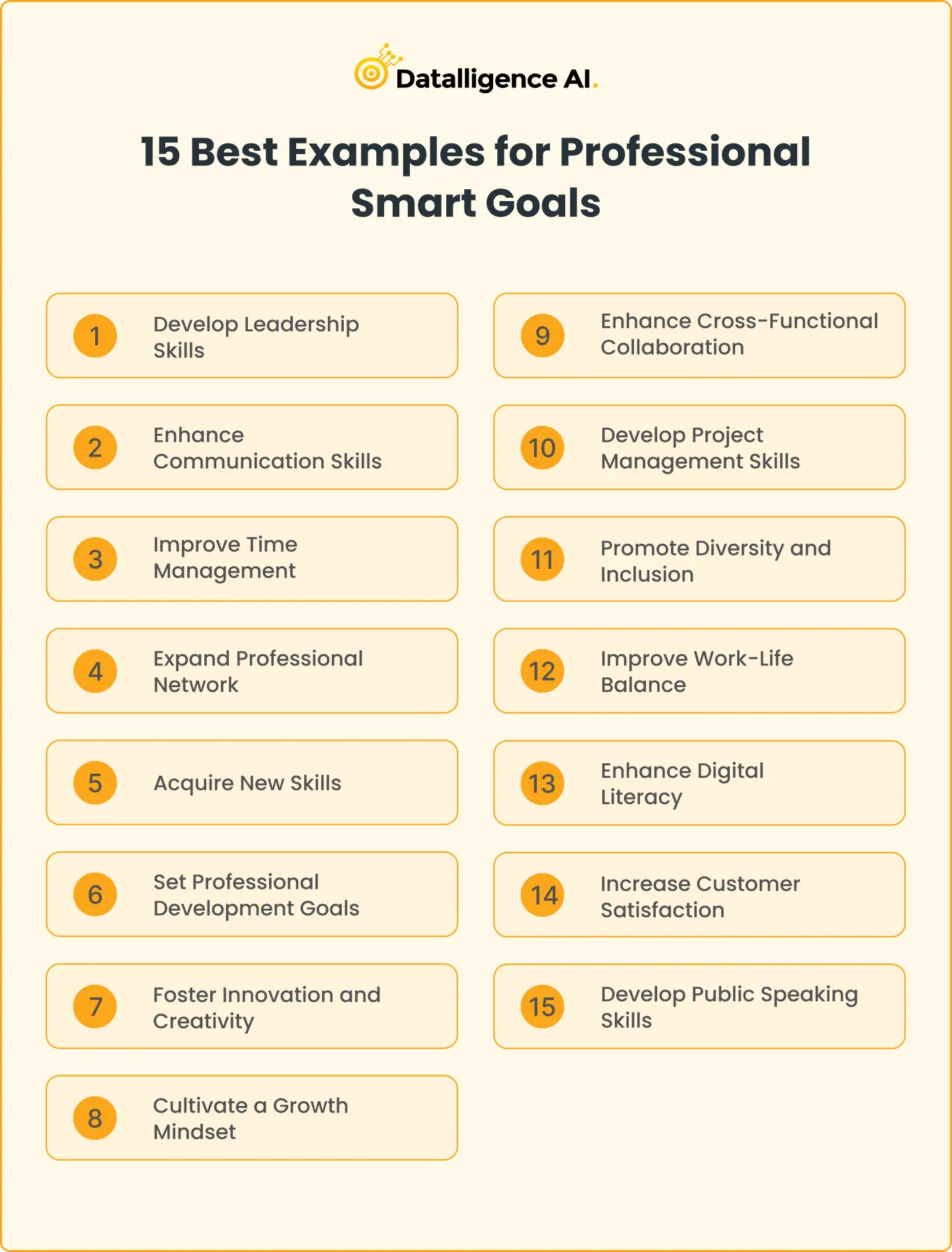
1. Develop Leadership Skills
Specific: Enhance leadership abilities to effectively guide and inspire teams.
Measurable: Attend leadership training workshops and track progress in implementing new strategies.
Achievable: Seek mentorship from experienced leaders and actively participate in team projects.
Relevant: Leadership skills are essential for career growth and taking on new responsibilities.
Time-Bound: Complete leadership training and demonstrate improved leadership skills within six months.
Developing strong leadership skills is crucial for career advancement. By attending leadership training workshops, seeking mentorship, and actively participating in team projects, you can enhance your ability to guide and inspire others. Set a goal to complete leadership training and demonstrate improved leadership skills within six months.
2. Enhance Communication Skills
Specific: Improve verbal and written communication skills to effectively convey ideas and information.
Measurable: Attend communication workshops, track progress in implementing new techniques, and seek feedback.
Achievable: Practice active listening, participate in public speaking opportunities, and engage in written communication exercises.
Relevant: Effective communication is essential for collaboration, problem-solving, and career advancement.
Time-Bound: Show measurable improvement in communication skills within three months.
Strong communication skills are valuable in any professional setting. To enhance your communication abilities, attend workshops, practice active listening, participate in public speaking opportunities, and engage in written communication exercises. Set a goal to show measurable improvement in your communication skills within three months.
3. Improve Time Management
Specific: Enhance time management skills to prioritize tasks and increase productivity.
Measurable: Utilize time-tracking apps, create schedules, and track progress in meeting deadlines.
Achievable: Use time-blocking techniques, eliminate distractions, and set realistic goals.
Relevant: Effective time management leads to increased productivity and reduces stress.
Time-Bound: Improve time management skills and meet deadlines consistently within six months.
Improving time management skills is essential for maximizing productivity. Utilize time-tracking apps, create schedules, and set realistic goals to stay organized and focused. Implement time-blocking techniques, eliminate distractions, and strive to consistently meet deadlines within six months.
4. Expand Professional Network
Specific: Build a strong professional network by connecting with industry peers and leaders.
Measurable: Attend networking events, join professional associations, and track the number of new connections made.
Achievable: Engage in networking opportunities, actively participate in industry discussions, and leverage social media platforms.
Relevant: A strong professional network opens doors to new opportunities and valuable insights.
Time-Bound: Increase the number of professional connections by 20% within one year.
Expanding your professional network can lead to new opportunities and valuable insights. Attend networking events, join professional associations, and actively engage in industry discussions. Set a goal to increase the number of professional connections by 20% within one year.
5. Acquire New Skills
Specific: Learn new skills relevant to your industry or desired career path.
Measurable: Enroll in online courses or workshops, track progress in mastering new skills, and obtain certifications.
Achievable: Dedicate time each week to learning, practice new skills, and seek feedback.
Relevant: Acquiring new skills enhances your expertise and increases your value in the job market.
Time-Bound: Obtain a relevant certification or mastery of a new skill within six months.
Continuously acquiring new skills is crucial for professional growth. Enroll in online courses or workshops, dedicate time each week to learning, and seek opportunities to practice new skills. Set a goal to obtain a relevant certification or achieve mastery of a new skill within six months.
6. Set Professional Development Goals
Specific: Identify areas for professional growth and set targeted development goals.
Measurable: Create a development plan, track progress, and evaluate achievements.
Achievable: Seek feedback, participate in training programs, and engage in self-reflection.
Relevant: Professional development goals align your career aspirations with your personal growth.
Time-Bound: Set and achieve three professional development goals within one year.
Setting professional development goals is essential for continuous growth. Identify areas for improvement, create a development plan, and track your progress. Seek feedback, participate in training programs, and engage in self-reflection. Set a goal to set and achieve three professional development goals within one year.
7. Foster Innovation and Creativity
Specific: Cultivate a mindset of innovation and creativity to generate new ideas and solutions.
Measurable: Collaborate on innovative projects, track the number of new ideas generated, and seek feedback.
Achievable: Engage in brainstorming sessions, encourage diverse perspectives, and explore new approaches.
Relevant: Innovation and creativity drive progress and competitive advantage in today’s workplace.
Time-Bound: Contribute to at least two innovative projects within six months.
Fostering innovation and creativity can lead to breakthrough ideas and solutions. Engage in brainstorming sessions, encourage diverse perspectives, and explore new approaches. Set a goal to contribute to at least two innovative projects within six months.
8. Cultivate a Growth Mindset
Specific: Develop a growth mindset to embrace challenges and view failures as opportunities for learning.
Measurable: Reflect on personal growth, track progress in embracing challenges, and seek feedback.
Achievable: Embrace new challenges, adopt a positive attitude, and practice resilience.
Relevant: A growth mindset supports continuous learning and personal development.
Time-Bound: Demonstrate a growth mindset in overcoming challenges within three months.
Cultivating a growth mindset is essential for continuous learning and personal development. Embrace new challenges, adopt a positive attitude, and practice resilience. Set a goal to demonstrate a growth mindset in overcoming challenges within three months.
9. Enhance Cross-Functional Collaboration
Specific: Improve collaboration and teamwork across different departments or teams.
Measurable: Participate in cross-functional projects, track progress in collaboration efforts, and seek feedback.
Achievable: Foster open communication, promote knowledge sharing, and engage in team-building activities.
Relevant: Cross-functional collaboration drives innovation and improves overall organizational performance.
Time-Bound: Demonstrate improved cross-functional collaboration within six months.
Enhancing cross-functional collaboration is vital for organizational success. Foster open communication, promote knowledge sharing, and engage in team-building activities. Set a goal to demonstrate improved cross-functional collaboration within six months.
10. Develop Project Management Skills
Specific: Enhance project management skills to effectively plan, execute, and deliver successful projects.
Measurable: Attend project management training, track progress in implementing new strategies, and seek feedback.
Achievable: Utilize project management tools and techniques, practice effective communication, and seek project management opportunities.
Relevant: Strong project management skills ensure the successful delivery of projects on time and within budget.
Time-Bound: Successfully manage and deliver three projects within one year.
Developing strong project management skills is crucial for successful project delivery. Attend project management training, utilize project management tools and techniques, and practice effective communication. Set a goal to successfully manage and deliver three projects within one year.
11. Promote Diversity and Inclusion
Specific: Advocate for diversity and inclusion within the workplace and strive for an inclusive environment.
Measurable: Participate in diversity and inclusion initiatives, track progress in promoting inclusivity, and seek feedback.
Achievable: Educate yourself on diversity issues, challenge biases, and actively support diverse voices.
Relevant: Diversity and inclusion foster innovation, creativity, and a positive work culture.
Time-Bound: Contribute to at least two diversity and inclusion initiatives within six months.
Promoting diversity and inclusion is crucial for creating an inclusive and welcoming workplace. Educate yourself on diversity issues, challenge biases, and actively support diverse voices. Set a goal to contribute to at least two diversity and inclusion initiatives within six months.
12. Improve Work-Life Balance
Specific: Achieve a better work-life balance by setting boundaries and prioritizing self-care.
Measurable: Track work hours, set boundaries, and evaluate personal well-being.
Achievable: Establish work-life balance strategies, practice self-care, and prioritize activities outside of work.
Relevant: Maintaining a healthy work-life balance improves well-being and overall job satisfaction.
Time-Bound: Demonstrate improved work-life balance within three months.
Improving work-life balance is essential for overall well-being and job satisfaction. Establish work-life balance strategies, practice self-care, and prioritize activities outside of work. Set a goal to demonstrate improved work-life balance within three months.
13. Enhance Digital Literacy
- Specific: Improve digital skills to keep up with technological advancements in your field.
- Measurable: Complete online courses on digital tools and platforms, and apply new skills in your work.
- Achievable: Dedicate time weekly to learning new digital skills and seek practical applications.
- Relevant: Digital literacy is crucial for staying competitive in today’s tech-driven job market.
- Time-Bound: Gain proficiency in at least three new digital tools or platforms within six months.
Improving digital literacy is crucial as technology continues to evolve rapidly. By focusing on this goal, you position yourself to better handle new technologies, improve efficiency, and stay relevant in your field. Completing courses and applying what you learn practically helps ensure that you are not only gaining theoretical knowledge but also effectively integrating new skills into your work.
14. Increase Customer Satisfaction
- Specific: Improve customer satisfaction scores by enhancing service quality.
- Measurable: Implement a customer feedback system, monitor satisfaction ratings, and track improvements.
- Achievable: Train staff on customer service best practices and address feedback promptly.
- Relevant: High customer satisfaction is vital for business success and client retention.
- Time-Bound: Achieve a 10% increase in customer satisfaction ratings within six months
Increasing customer satisfaction is key to business success and client retention. By setting up a feedback system and training staff, you create a structured approach to understanding and improving customer experiences. Tracking satisfaction ratings ensures that you can measure progress and make necessary adjustments to achieve the desired increase in customer satisfaction.
15. Develop Public Speaking Skills
- Specific: Improve your public speaking skills to effectively deliver presentations and communicate ideas.
- Measurable: Join a public speaking club, complete a speaking course, and deliver at least three presentations to different audiences.
- Achievable: Enroll in a local Toastmasters club or an online public speaking course and practice by volunteering for speaking opportunities at work or community events.
- Realistic: Public speaking clubs and courses are widely available, and regular practice can significantly enhance your skills.
- Time-Bound: Achieve a noticeable improvement in public speaking skills within six months.
Developing public speaking skills is crucial for effective communication and leadership. By joining a club or course and actively seeking opportunities to speak, you can build confidence, improve your delivery, and become a more persuasive communicator.
Benefits of Setting SMART Goals
Implementing SMART goals within an organization offers numerous benefits for both employees and the company as a whole. Here are ten advantages of setting SMART goals:
- Role clarity and focus: SMART goals provide clear direction and ensure that employees understand their roles and responsibilities.
- Employee productivity: SMART goals enable employees to track their progress and stay focused on achieving their objectives, leading to increased productivity.
- High-performance culture: By setting realistic and achievable goals, SMART goals promote a culture of high performance and motivate employees to excel.
- Employee motivation: Clear goals with specific targets and deadlines provide employees with a sense of purpose and motivation to work towards meaningful objectives.
- Employee development: SMART goals offer opportunities for employees to enhance their skills, knowledge, and personal growth, contributing to their professional development.
- Continuous learning and growth: SMART goals encourage a culture of continuous learning and provide insights into employee abilities and areas for improvement.
- Better onboarding experiences: SMART goals can be implemented during the onboarding process, ensuring that new hires have clear and achievable goals to work towards.
- Talent retention: SMART goals promote fairness, clarity, and objective results, which contribute to employee satisfaction and help retain top talent within the organization.
- Improved feedback system: SMART goals provide objective data and insights that can be incorporated into performance reviews, facilitating constructive feedback and employee development.
- Focus on employee experience: By ensuring clarity and fairness in goal setting, SMART goals contribute to a positive employee experience, promoting engagement and satisfaction.
Difference Between SMART Goals and OKRs
While SMART goals and OKRs (Objectives and Key Results) share similarities, they have distinct differences in their approach and focus. OKRs originated from the concept of SMART goals but expanded upon it. While both frameworks aim to provide clarity and measurement, OKRs focus on the objective and its measurable results.
SMART goals encompass the five elements of specificity, measurability, assignability, realism, and time-bound. In contrast, OKRs focus on objectives and key results, answering the questions of what the goal is and how success will be measured.
By incorporating the elements of SMART goals into OKRs, organizations can enhance their goal-setting process and ensure more comprehensive and effective objectives.
Tips for Setting Effective SMART Goals
While the SMART acronym provides a framework for setting effective objectives, here are nine additional tips to ensure the success of your SMART goals:
- Use simple language: Keep your objectives short and use straightforward language to ensure easy understanding and recall.
- Break goals into sub-tasks: Complex goals can be broken down into smaller, more manageable sub-goals to maintain specificity and assignability.
- Include objectives and key results (OKRs): Combine the SMART goals framework with OKRs to provide a more comprehensive approach to goal setting and measurement.
- Define success metrics: Clarify how you will measure success, especially for subjective goals, by defining specific metrics or indicators of progress.
- Consider training opportunities: Identify any training needs that arise from your SMART goals and provide opportunities for employees to enhance their skills.
- Enlist coaches, buddies, and mentors: Support employees in achieving their goals by providing mentorship and guidance from experienced colleagues or external coaches.
- Set a schedule: Provide employees with a clear timeline or schedule for each goal to help them stay on track and meet their objectives within the designated time frame.
- Track progress: Regularly monitor and track progress towards SMART goals, enabling employees to measure their achievements and make adjustments as necessary.
- Adjust goals based on feedback: Encourage employee input and feedback on their goals, and be open to adjusting objectives as needed to ensure their relevance and effectiveness.
How to Help Employees Reach Their SMART Goals
As an HR professional or manager, you can play a crucial role in helping employees reach their SMART goals. Here are seven tips to support employees in achieving their professional goals:
- Document the goals: Ensure that SMART goals are documented and accessible to both employees and management, allowing for easy progress tracking and reflection.
- Align the entire team: Foster a collaborative environment where team members can see how their goals align with the broader organizational objectives, promoting cooperation and shared success.
- Encourage goal sharing across teams: Create opportunities for employees to share their goals with colleagues from different teams, fostering collaboration and idea sharing.
- Make goals easily accessible: Centralize SMART goals and other business objectives in a shared platform or document, making them easily accessible to all employees.
- Regular check-in meetings: Schedule regular check-in meetings to assess progress, address challenges, and provide guidance and support to employees.
- 360 reviews: Implement 360-degree feedback processes to gather insights from multiple perspectives, providing employees with a well-rounded view of their performance and areas for improvement.
- Bring the focus on the employee experience: Ensure that goals are fair, clear, and promote employee satisfaction and engagement, considering individual preferences and strengths.
Conclusion
Setting professional SMART goals is a fundamental aspect of personal and career development. By using the SMART framework, individuals and organizations can define objectives that are specific, measurable, achievable, realistic, and time-bound. Whether you are a sales professional, marketer, project manager, finance professional, graphic designer, new employee, or senior employee, the examples provided in this article can serve as inspiration for setting your own SMART goals in 2025.
Remember, SMART goals provide clarity, focus, and motivation, enabling individuals and teams to achieve their objectives and contribute to the overall success of the organization.
At Datalligence.AI, we believe in the power of SMART goals and offer innovative solutions to help organizations align their goals, measure progress, and drive performance. Our employee development software and 360-degree feedback tools enable organizations to support employees in reaching their SMART goals and create a high-performance culture.
Book a demo with Datalligence today to see how our tools can help you achieve your goals and drive success in 2025 and beyond.



